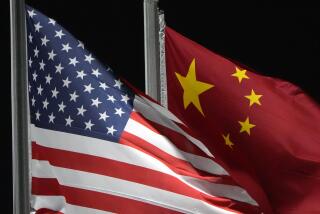U.S. sanctions selectively under its Iran policy
Reporting from Washington — The Obama administration rolled out its first penalty Thursday under the new U.S. sanctions on Iran, but carefully avoided any challenge to Russian and Chinese companies that would have risked diplomatic fallout.
The administration sanctioned a Swiss subsidiary of Iran’s national oil company, while declaring that it was weighing punishments against other, unidentified foreign companies.
The 4-month-old sanctions are aimed at drying up foreign investment in Iran’s oil and gas sector in hopes of persuading Tehran to agree to limits on its disputed nuclear program. Some members of Congress have pressed the Obama administration to not shy away from penalizing huge Chinese, Russian and Turkish firms that have been seeking energy deals with Iran as Western companies have pulled out.
The restrained approach drew criticism from some lawmakers and private analysts, who argue that unless these companies are quickly persuaded to back off, the Western companies that have abandoned the Iranian market — and lost substantial revenue — will demand an end to the sanctions and the entire effort will collapse.
The sanctions on Naftiran Intertrade Co. will prevent it from receiving loans of more than $10 million from any U.S. bank and prohibit various benefits from the U.S. government. But officials said the more significant penalty would be an indirect one: They said the move was likely to make foreign firms unwilling to do business with the Swiss company for fear they could be hit by U.S. penalties.
The U.S. granted waivers from punishment to four large European energy companies — Total of France, Statoil of Norway, Eni of Italy, and Royal Dutch Shell of Britain and the Netherlands — that have promised they are in the process of withdrawing from the Iranian market.
U.S. officials signaled that they would rather persuade foreign energy companies to back away from Iran than penalize them.
“The goal here is not to impose sanctions for sanctions’ sake, but to end companies from doing business with Iran,” said James Steinberg, the deputy secretary of State.
Rep. Ileana Ros-Lehtinen (R-Fla.), ranking minority member on the House Foreign Affairs Committee, said that “the absence of any sanctions on Russian and Chinese companies is very conspicuous.”
The administration “must not continue to cover for Russian and Chinese activities which undermine U.S. efforts to pressure the Iranian regime,” she said.
Mark Dubowitz of the Foundation for Defense of Democracies, a research organization that favors strong sanctions, said that “if the Obama administration opts for only symbolic and selective measures, it could collapse our Iran policy, making it likely to require more drastic measure to prevent Iran from acquiring nuclear weapons.”
Yet penalties imposed on Russian and Chinese companies could have a risked a major collision with those powers.
Russia, which badly wants to continue its energy deals with Iran, has been trying to organize other major developing nations to resist the energy sanctions imposed by the U.S. and its industrialized allies. China also has been vocal about its unhappiness with the sanctions.
Steinberg, asked if the administration was trying to avoid a fight with these countries, denied the suggestion. He said U.S. officials didn’t find “sanctionable” violations under the law when it examined the countries’ trade with Iran.
paul.richter@latimes.com
More to Read
Sign up for Essential California
The most important California stories and recommendations in your inbox every morning.
You may occasionally receive promotional content from the Los Angeles Times.











